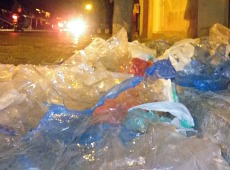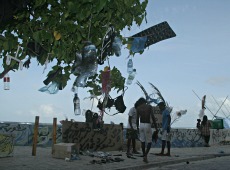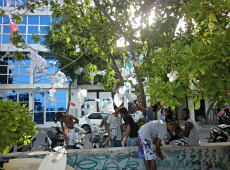Participants attending this week’s Maldives International Renewable Energy Investors Conference consider the event a “good beginning”, but claimed political instability was presently hampering foreign investors’ confidence in the sector.
The two day event, which concluded yesterday (June 17), aimed to facilitate long-term partnerships between international investors, project developers, energy companies and utilities groups in order to enable successful renewable energy projects throughout the Maldives.
The Ministry of Environment and Energy hosted conference at Bandos Island Resort and Spa in an effort to boost investor confidence and attract renewable energy financing.
Although Environment Minister Dr Mariyam Shakeela noted that the conference was successful, she also urged participants to “reflect on our mutual needs” and emphasised that investments will be “protected, facilitated, and supported by the government” during her concluding speech yesterday.
“Your need to promote your [renewable energy] products and our need to reduce energy costs – that of course is a huge issue as was mentioned here so many times – and also of course to combat climate change,” said Shakeela.
“We currently rely extensively on imported fossil fuels, as we have heard here over and over and over again these last few days. Yet paradoxically, many islands have ample but underutilized renewable energy resource potential,” she continued.
“The Ministry of Finance and Treasury is working to create an enabling environment for investments in general, which I believe is a concern of a lot of investors,” she added.
Meanwhile, Maldives-based representatives from the World Bank (WB) and Asian Development Bank (ADB) present at the conference pledged their continued support in an effort to attract renewable energy investors.
ADB Director Mr Yongping Zhai pledged to “go as far as it costs” to transform Maldives into a renewable energy dependent country, as opposed to oil dependent, according to the Environment Ministry.
However, he noted that although the Maldives has the commitment, market potential, resources, and willing investors for renewable energy, there is a “missing link to put these pieces together”.
“In theory things should work, but why things are not working so far is [the lack of] the right business model,” said Zhai. “That’s the purpose of this conference and of the ADB’s work.”
The WB considered the conference to be a “good initial first information gathering” event for facilitating renewable energy investments and emphasized that it was working very closely with the Maldives government to develop the energy sector and national financial institutions, said WB Senior Energy Specialist Abdulaziz Faghi.
In an effort to boost investor confidence, the Environment Ministry emphasised the WB would guarantee any investments made in the Maldives.
“One of the issues facing the private sector investing in any sector is the payment guarantee and their concern with the return on investment,” State Minister for Environment and Energy Abdul Matheen Mohamed told Minivan News yesterday.
He explained that the government of Maldives has allocated US$5 million from the International Development Association (IDA) financing though the World Bank, which will be leveraged up to US$ 25 million.
“So basically the World Bank will be issuing a guarantee for this amount to give guarantees to the investors investing [funds] under the scaling-up renewable energy program (SREP) investment plan,” said Matheen.
He noted that conference participants concerns have “been resolved though the guarantee facilities introduced by the World Bank”.
Foreign investors lacking
Following the conference yesterday, Renewable Energy Maldives Managing Director Dr Ibrahim Nashid told Minivan News that he believed banks and foreign investors crucial to revitalising the national energy “didn’t turn up” at the event.
“The main idea was to bring investors here, but I don’t think that has happened,” said Nashid.
He explained that while Maldives-based institutional representatives from the WB, ADB, United Nations Development Programme (UNDP) and various other Maldivian institutions attended the conference, individuals with authority to authorize lending and/or donor funds were not present.
 “Basically there wasn’t any financial institution that could give the finance or lend the money,” said Nashid. “No international banks came and what is very noticeable there wasn’t Indian investors. Not a single Indian company was represented.”
“Basically there wasn’t any financial institution that could give the finance or lend the money,” said Nashid. “No international banks came and what is very noticeable there wasn’t Indian investors. Not a single Indian company was represented.”
“ADB was saying they have earmarked funds for the Maldives, but their idea was also to leverage that with some other lending institution and that was not there,” he added.
Nashid noted that none of the Maldivian banks were present at the conference.
“The Islamic Development Bank (IDB) was there, but not the Islamic Bank in Male’, even the Bank of Maldives didn’t attend,” said Nashid.
“It shows the confidence that everybody has, [which is] the reason the World Bank is talking about giving a bank guarantee,” he continued.
Although Minister Shakeela was asked many times about what the government would do to guarantee investments “she skirted the question saying the ADB and WB is giving the guarantee,” according to Nashid.
“That was not the issue, the issue is what happens to our investments,” he said. “The GMR case is very very open and obvious to everyone. The issue of political instability was very much skirted, [but] everybody knew.”
Nashid claimed that most conference participants who discussed renewable energy investments said a decision would not happen until after the presidential election scheduled for September.
“We need political stability here, without political stability I don’t think any project is going to take off,” said Nashid.
“We can do the preparation of paperwork, etc. but money will not be put on the table. That’s the message we get from abroad,” he added.
These sentiments were echoed by conference participants representing various private sector businesses.
“It was a good start, but this is really just a beginning. There were not very many investors present,” an infrastructure company representative told Minivan News on condition of anonymity.
“The three things investors are looking for are credibility, stability, and return on the investment,” a telecommunications company representative told Minivan News on condition of anonymity.
The source explained that political instability was the main concern preventing investors from committing to renewable energy development. He also agreed with another conference participant’s observation that political instability in the Maldives was the ‘elephant in the room’ at the event.
“There were very few investors present, which is not surprising. No one is going to be eager to invest [in developing renewable energy] until after elections,” he added.





 The JSC was required to
The JSC was required to